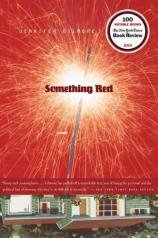Reading Group Guide
Discussion Questions
Something Red

1. Gilmore includes an epigraph selected from Grace Paley's "Faith in the Afternoon" that reads "If you have something sensible to say, don't wait. Shout it out loud right this minute." Do you think these lines effectively capture the tone of the novel?
2. The political landscape is a presence that directly affects the lives of the characters. Discuss the political events and situations that were relevant at the time. Do you have any memories of these events?
3. Food plays an enormous role in the novel --- from the grain embargo to Sharon's cooking, to Vanessa's eating, to Tatiana's meringue cookies. Discuss the many contexts in which Gilmore uses food and the significance in each.
4. How would you compare the public opinion of Carter and his administration in the story with current attitudes towards the U.S. government? Can you relate to any of the characters in respect to this question? Who, and why?
5. At the forefront of the novel is Sharon's "mid-life crisis." She claims that "she had lost touch with the earth, with the actual ground of this planet, with her home and the people in her home, and that she floated, wholly untethered, unsure as to what her role in the world now was and how she would ever get back down to realize it" (21). Do you think that this phenomenon can be seen as unique to her generation of women? Or is her predicament timeless?
6. The Olympics surface several times in the novel. Sharon attributes a greater power to the tradition, one that is echoed in Ben's rally later on. She remembers that "it was the Soviets who swept the medals that year. It was 1956, just before she'd moved East, and they'd watched the Russians participate for the first time; it was as if they were watching the very moment they achieved world domination" (27). Do you think Sharon and Ben were right to believe that the Olympics are "outside" of politics? Has our perception and the importance with which we imbue the Olympics changed in the past three decades?
7. Dennis muses that "socialism hadn't saved anyone, had it? People were still hungry and poor and cruel and stupid. It hadn't changed a thing" (42). It is clear that Dennis sees the misfortune of humanity as inevitably fixed. Which characters might disagree with him? What would they argue in their defense?
8. Vanessa, a teenager struggling with bulimia, recalls a set of Russian dolls from her childhood: "Looking at them in a descending line, she would wonder if all these pieces together constituted one doll, or if they were really 12 different dolls, with separate selves and souls" (47). How do you think this thought reflects Vanessa's own struggle with self-identity? Do you think this question of multiple selves carries over to any of the other members of her family?
9. Ben moves from being a high school athlete who hangs out with his teammates to a more radical lifestyle when he goes to college. How does this change when he chooses to take action against the Olympic boycott? What parts of his personality do you see merge in these scenes?
10. Sharon and Vanessa liken Ben's rally speech to the "call and response of synagogue." How much does Jewish identity play into the novel? Do you think it is overshadowed by their nationalistic loyalties?
11. When Ben retrieves Vanessa after their night of partying, he wonders, "just as he said it, what it would mean exactly, but still he told his sister, his little sister, ‘Vanessa,’ he said. ‘Let me take you home’” (246). What do you think this phrase means to Ben, and the rest of his family? How is it similar or different from Dennis and Sharon's reconciliation at the Ritz?
12. Discuss the role of music in the novel. How does it highlight both the differences and the similarities in the various members of the Goldstein family?
13. All the characters seem to be reacting in some way to the past, whether it's their own childhoods, or the lives of their parents. How does memory function in the novel and how does the past haunt the present? Does it affect the decisions these characters make? Are they running from the past or are they trying in some way to retrieve the past?
14. Discuss the significance of the “Snow Maiden” story, a recurring thread throughout the novel: "The Snow Maiden listened to the song and tears rolled down her cheeks. And then her feet began to melt beneath her; she fell onto the earth and then she was gone, a light mist rising from the place she had fallen" (266).
15. Were you surprised by the end of the novel? Discuss the importance of secrets and trust in the novel.
16. In her last moments with Dennis and her husband, Tatiana feels it necessary to clarify that it was, indeed, Helen singing at a Workers Party years before. Why does she do this? What do you make of the rest of her confession? Can you sympathize with her?
Tips for Enhancing your Book Club
1. Visit www.jennifergilmore.net to learn more about Jennifer Gilmore's past, present and future projects. You can even arrange to have her join your book group's discussion!
2. Host a screening of the movie Miracle, which chronicles the 1980 United States Ice Hockey team's defeat of the Russians and brings to life Cold War tensions.
3. If in the area, visit Brandeis University to learn more about its unique activist background.
4. Bake meringue cookies to share with your book club. Here's a link to some Tatiana might have made.
5. Want to be brave and try cherries jubilee, a la Sharon's Food Matters party? Be careful! Here's an easy recipe.
Something Red
- Publication Date: March 10, 2011
- Paperback: 320 pages
- Publisher: Mariner Books
- ISBN-10: 0547549423
- ISBN-13: 9780547549422







